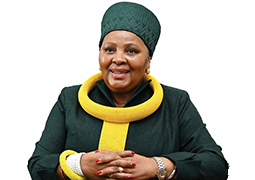
The Speaker of the National Assembly (NA), Ms Nosiviwe Mapisa-Nqakula, will this morning receive a report from the independent panel set up to determine if there is prima facie evidence to institute an impeachment inquest against President Cyril Ramaphosa.
This follows the controversy surrounding an alleged robbery two years ago at President Ramaphosa’s Phala Phala farm in Limpopo. The incident became the subject of a formal parliamentary process after the Speaker announced in September the appointment of a panel to investigate whether there are any grounds to begin an impeachment process to remove the President in terms of Section 89 of the Constitution.
This section states: The National Assembly, by a resolution adopted with a supporting vote of at least two thirds of its members, may remove the President from office only on the grounds of a serious breach of the Constitution or law; serious misconduct or the inability to perform the functions of the office.
It further says that anyone who has been removed from the office of the President in terms of the above subsection may not receive any benefits of that office and may not serve in any public office.
In June this year, an African Transformation Movement (ATM) Member of the National Assembly, Mr Vuyo Zungula, submitted a proposed motion to the Speaker requesting the National Assembly to initiate such an enquiry on specific charges. The Speaker initially declined this motion, as well as another request, this time from the United Democratic Movement (UDM), for a parliamentary investigation into the President’s alleged conduct and for him to be placed on sabbatical while the investigation proceeds.
The Speaker declined the UDM's submission on the grounds that it did not constitute or was not accompanied by a substantive motion, as envisaged in the Rules for this particular enquiry to be initiated. Furthermore, there existed no legal basis for Parliament to compel the President to take leave. For Parliament to undertake such an inquiry, there must be basis in the Constitution, the law or the NA’s Rules.
The ATM motion was not compliant with the applicable NA Rules and, following engagements with Mr Zungula, as directed by Rule 129B to ensure compliance of the motion with the rules, an amended version of the motion was subsequently submitted on 18 July 2022.
“Rule 129C of the NA Rules requires that when the motion is in order, the Speaker must immediately refer it and supporting documents to an independent panel of experts. In terms of the Rules, the Speaker must appoint the panel after giving political parties represented in the Assembly a reasonable opportunity to put forward nominees, and after she has given due consideration to all persons so nominated,” Parliament explained in a statement.
The function of the independent panel is to conduct a preliminary assessment of the proposed motion and make a recommendation to the Speaker within 30 days on whether sufficient evidence exists to show if the President committed any of the violations specified in the motion. The panel later requested an extension, which was granted until 30 November.
A panel referral therefore does not constitute a parliamentary impeachment process, but an assessment of the supplied evidence by legal and constitutional experts to determine if, in terms of the Constitution, it is adequate to warrant a further process.
The Rules also state that the panel must consist of three fit and proper, competent, experienced and respected South African citizens that may include a Judge, and who collectively possess the necessary legal and other competencies and experience to perform the preliminary assessment of the motion. If a Judge is to be appointed, the Speaker must do so in consultation with the Chief Justice.
The Speaker then requested all political parties represented in the NA to nominate candidates to serve on the panel. Each nomination must be in writing and must include the full names of the nominees and a motivation focusing particularly on the requirements of the applicable Rules.
After applying her mind to 17 nominees recommended by political parties represented in the National Assembly, the Ms Mapisa-Nqakula appointed three members to serve on the independent panel to conduct a preliminary assessment of a motion tabled in accordance with section 89 of the Constitution.
“After careful consideration of the names at her disposal, assessment of their credentials against the provisions of the Rules, as well as a need to secure gender and demographic balance, and having established their availability to serve on this Panel, the Speaker has appointed three fit and proper persons to discharge their assigned responsibilities,” said Parliament in a statement.
The appointed persons are:
- Justice Sandile Ngcobo, former Chief Justice of the Constitutional Court of South Africa, appointed as Chairperson of the Panel;
- Judge Thokozile Masipa, former Judge of the Gauteng Division of the High Court of South Africa;
- Advocate Mahlape Sello (replaced Professor Richard Calland)
During a debate of the Presidency’s Budget Vote in June, President Ramaphosa refuted accusations by some Members of Parliament that he was failing to honour his accountability obligation by not giving a detailed report about the alleged robbery at his farm, allegedly involving millions in foreign currency.
He said the allegations were the subject of a criminal complaint, therefore the law must take its course and that due process must be followed. “I want to reassure and indeed remind this House that accountability is a responsibility I have never shirked or shied away from,” the President said.
“I will therefore not be responding to speculation, conjecture, allegations, or so-called revelations. These must be ventilated in the proper and appropriate forums. I repeat; the law must take its course,” President Ramaphosa explained.

